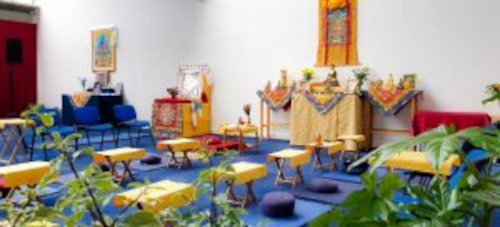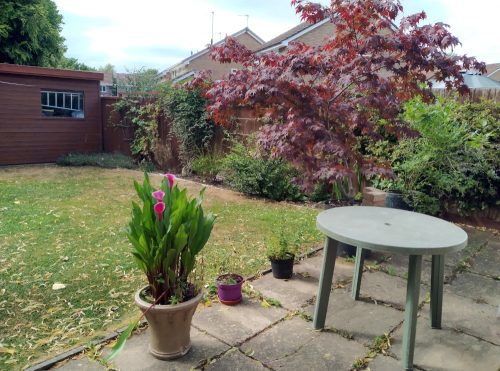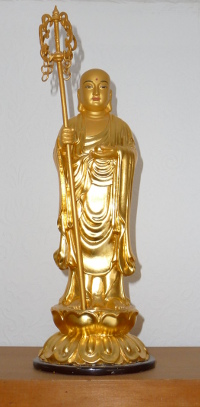August 2022 Newsletter
Regional Sangha Day in Leeds
It was lovely to see so many Sangha members in Leeds for the Regional Sangha Day on the 16th of July. The event was held at the Jamyang Buddhist Centre, a Tibetan Buddhist centre in the Holbeck area of South Leeds.
Three monks travelled down from Throssel Hole Buddhist Abbey for the day; Rev. Mugo, Rev. Sanshin and Rev. Kanshin, and there were also three monks from the Midlands there, Rev. Saido from Telford Buddhist Priory, Rev. Alicia from Sitting Buddha Hermitage in Cromford, and Rev. Aiden. Altogether there were nearly 30 people there for the day.
The day started at 10am with a meditation period, followed by Morning Service and a Dedication of Merit Ceremony. We then stopped for a cup of tea, and this gave us all a chance to catch up with old friends, as many of us haven’t met since late 2019. After the break Rev. Saido gave a Dharma Talk on Ceremonial, which took place in the main hall at the Jamyang Centre, as had the meditation period and ceremony earlier in the day.

After a break for lunch there were a number of activities on offer, including going for a walk or playing the ‘Training and Enlightenment Game’, which is a board game developed at Shasta Abbey. We then all came together again for Evening Service and meditation in the main hall.
It was quite a warm day, with the temperature reaching 27C or so by the end of the afternoon, and the main hall, which is upstairs with large roof windows, became very hot during the afternoon. It was a relief to meet for tea in a cooler room downstairs, and there was a good discussion period which rounded off the day nicely.
Thank you to all those who organised the day, in particular the members of the Leeds meditation group.
Nottingham Day Retreat
On the 23rd of July we held our first Day Retreat in Nottingham since the Autumn of 2019. The retreat was held in a room in the library in Beeston, and ten lay Sangha members took part, from Nottingham and the surrounding areas.
In the morning we had a meditation period followed by Morning Service, and this was then followed by a Dharma talk and discussion which took us up to lunch time. Following a bring-and-share vegetarian lunch we had two periods of meditation in the afternoon, with walking meditation in between, and the day ended with tea and cake and an opportunity to ask questions.
It was really nice to be able to practise together again in this way after such a long break, and we hope it won’t be quite so long before the next Day Retreat. The venue worked very well for the retreat, and thank you to all those who helped organise the day.
Forthcoming Events: The Festival of Kshtigarbha Bodhisattva
On Saturday the 13th of August we will be celebrating the Festival of Kshtigarbha Bodhisattva. Kshtigarbha is usually depicted as a monk, carrying a staff and a “wish-fulfilling jewel”, and symbolises gentleness and the importance of offering.
It is traditional to make offerings of stones to Kshtigarbha; when we truly give ourselves to practice we find that this “ordinary pebble” we have offered, is in fact a precious stone. Anyone joining the ceremony is invited to have a small stone with them to offer during the ceremony.
In addition to welcoming visitors to the temple for the festival (please book in advance), we will also be holding the festival over zoom so that Lay Sangha members can join in from where they are. Full details of the festival day will be sent out by email to Lay Sangha members prior to the festival.
This festival day will run from 10am to 4pm, with the Festival and Dharma Talk both in the morning so that people can come just for those if they would prefer. There will then be the option to stay on for a bring-and-share lunch and an afternoon of meditation, followed by tea and biscuits and an opportunity to ask questions.
Buddhist Stories
There are many stories in Buddhism, from the time of the Buddha onwards, and they are very helpful in illustrating aspects of the Buddha’s teaching and Buddhist practice.
Helping a woman cross a river
This well-known Buddhist Story is about how we so easily respond to events with indignation, and about how important it is to let go of this indignation, rather than carrying it around with us as a mental and emotional burden.
In our meditation practice we do our best to notice when we are stuck in repetitive trains of thought, and we do our best to not carry them on any more. This can be a challenge with any kind of repetitive or obsessive thinking, but it can be particularly hard to let go of when we think that we are in the right and that someone else is in the wrong. This sense of indignation can be triggered by events in our own life, or even by something we hear about in the media which is really nothing to do with us. We may hear a story of someone acting in a way that seems to us, and perhaps to most people, to be very inconsiderate, or uncaring, and in our minds we may become very indignant about this. ‘How could they?’, ‘Don’t they realise…?’. We may find ourselves thinking about it for hours, just continually going over the same old ground.
Why do we do this? And why is it so hard to let go of?
If we reflect carefully on what is going on here, we may realise that in judging this other person as acting badly, we are implicitly seeing ourselves as being so much better. We would never do such a thing, would we? This subtle pride in our ‘superior goodness’ massages our sense of self, building up an illusory sense of ‘being better’. No wonder that a part of us doesn’t want to let it go.
It may also offend our sense of how things ‘ought to be’; perhaps we are afraid that if people behave this way it will threaten our sense of living in a stable society?
Either way, there is something at stake for us, it seems, and so we find it very difficult to let go of. What we may not have noticed however, is that there is a high price to pay for this, as in carrying it on we are causing our minds to be very disturbed. It is a state of suffering, not one of being at ease.
There is a short Buddhist story which is about exactly this sort of situation:
Tanzan Hara (1819-1892) was a famous Zen monk of the Meiji Period. When he was a young monk he visited many different monasteries, travelling with another monk called Ekido, who was a close friend of his.
One day when the two of them were travelling together, they came to a narrow river which could usually be crossed easily at a shallow ford. However, the river was now in flood, and without a bridge the only way to get across was to wade through the nearly waist-deep waters. That was no problem for the two young monks, but it was too deep for a local woman who was standing on the bank unable to get to the other side. She was keen to cross, but was afraid that she would be swept away by the strength of the current.
As the two monks approached, Tanzan offered to carry her across, and when she accepted he picked her up and waded through the water, setting her down safely on the opposite bank. Hardly breaking his stride he carried on up the road, not even hearing the grateful woman call after him to thank him for helping her.
As the two monks continued on with their journey, Tanzan gradually realised that his friend was unusually silent and withdrawn, as though lost in thought about something. For his part, Ekido was angry and indignant that his travelling companion had acted in the way that he had, as it was strictly against the monastic regulations for monks to have physical contact with members of the opposite sex. Not only did Ekido know that, but he knew that Tanzan knew it too!
As night fell and they approached the monastery where they were to spend the night, Ekido eventually couldn’t keep his indignation to himself any longer, and blurted out, “What on earth were you doing carrying that woman across the river? You know we’re not allowed to do that. How could you do such a thing?”
Tanzan turned to his friend and said, “But I put her down as soon as we got to the other side, how come you’re still carrying her?”
Ekido was lost for words at this, and they completed their journey in an uneasy silence.
Although this story is told as a story about Tanzan, it is Ekido’s behaviour that is perhaps the most useful to reflect on. In the story, Tanzan’s behaviour is portrayed as straightforward; he sees someone in need of help and offers that help. Having done what he could he then carries on to the next thing, not even looking back over his shoulder. Ekido on the other hand is thrown into inner turmoil in response to the actions of someone else. Actions that didn’t involve him or directly affect him.
Ekido finds himself in the same position that we often find ourselves in. Something has happened, and he has responded to it by being angry and feeling outraged, as though he was personally wounded by Tanzan’s actions. Mixed in with a sense of being better than his friend, he just keeps running through the incident in his mind, over and over, and probably doesn’t even realise that he has been ignoring his travelling companion for most of the day. He probably couldn’t tell you much about the scenery that they had walked through either!
What Ekido hasn’t noticed is that, even if Tanzan has acted inappropriately, then that is Tanzan’s problem. In obsessing about it for hours on end, Ekido has made it his problem.
This is perhaps even more noticeable for us if we are indignant about a story that we hear on the news, because it really has got nothing to do with us. It is that person’s problem, but if we can’t let go of our indignation about it, then we make it our problem. Why would we want to do that? It’s like walking along the road and finding a stick lying by the side of the road that has nothing do with us. We pick it up and start hitting ourself with it over and over again, and somehow think that this proves we are a better person. Of course it doesn’t, it just shows our own judgementalism and tendency to want to feel better than others. To carry on with this for hours on end is a state of suffering, as we are making our mind very disturbed and unsettled. To stop doing it is liberation.
In Ekido’s situation, there might be something practical that he could or should do in response to Tanzan’s behaviour. It may or may not be appropriate to mention it to someone at the next monastery they get to. But that is a separate question. Whether it is or isn’t, there is really no need for him to have been carrying this burden of indignation for most of the day.
Ekido’s situation is actually quite unusual, in that when he confronts Tanzan with his accusations, he receives some really good teaching in return; to put down the burden instead of carrying it around. If we were to confront the perceived wrong-doer it would probably just lead to an argument, as people very quickly become defensive of their actions. Much of the time though, there isn’t any way of confronting the other person anyway, (which is perhaps very fortunate), and we are stuck with these thoughts in our head. What can we do then?
Of course, we can’t do anything unless we begin to notice that we are doing this to ourselves. Having a meditation practice really helps with this, and as we deepen our practice we may realise that we are noticing ourselves doing this more than we used to. That is one of the benefits of meditation; that we notice more the suffering that was there anyway. In the short term it might not feel like much of a benefit! But it gives us the opportunity to do something about it. If we don’t turn away from it, then feeling the suffering ever more sharply eventually leads us to have to do things differently. We eventually get to the point where it hurts so much that we just can’t do it any more, and we have to stop.
Whilst we are in the midst of this process, we may find ourselves wondering whether this happens to others, or whether it is just us. However, there is really no benefit in doing that, because if that is how it is for us, then that is what is there for us to train with. Whether everyone else also has this as an issue, or whether no one else has, doesn’t actually make any difference to our own reality.
As we go about our lives we may find that there are many situations or people that we could find fault with. What should we do? Stay in bed? We have to be able to live in the world as it is, and decide how to respond based on how the world is. When we see a situation or a person’s behaviour that seems inappropriate, or even dangerous, there might be something that we can do in response to benefit the situation, but often there is nothing we can do.
Either way it is important to see how we might be getting mentally caught up in the situation, and to do our best to let go of that. Why continue to saddle ourselves with the burden of indignation? Often we can’t change conditions, but we can always do something about how we respond to them. We can metaphorically leave the situation behind on the other side of the river, rather than carrying it with us all day.
Sources:
The version of the story used here is loosely based on one on the Sotoshu website:
https://www.sotozen.com/eng/library/stories/vol04.html
Photos of the Garden
It was 39 Celsius or so in Leicester on the 19th fo July, and our garden is looking a bit parched at the moment. We do have some nice lilies in flower though, and the Japanese Acer is looking reasonable.

We have had a lot of berries from our blueberry, gooseberry and Boysenberry bushes this year, and we have got lots of plump blackberries ready for picking as well!

Alms Bowl Requests
Donations of Food
Offering food is a traditional way to support a monk, and all donations of vegetarian food are most welcome. In particular:
- porridge oats
- peanuts or other nuts
- peanut butter
- fresh fruit and vegetables (except garlic or peppers)
- dried herbs
- cheese, eggs and yoghurt
Any other suitable items would also be appreciated.
Donations
The temple is dependent on donations for its continued existence, and any financial support you are able to offer is greatly appreciated. Details of how to offer support can be found on the Donations page of the website.
All donations are received with gratitude



